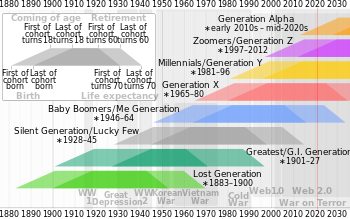الجيل إكس
| جزء من سلسلة عن |
| الأجيال |
|---|
 |
الجيل إكس Generation X أو Gen X هو demographic cohort following the baby boomers and preceding the Millennials. There are no precise dates for when Generation X starts or ends. Demographers and researchers typically use birth years ranging from the early-to-mid 1960s to the early 1980s.
Members of Generation X were children during a time of shifting societal values and as children were sometimes called the "latchkey generation", due to reduced adult supervision as children compared to previous generations, a result of increasing divorce rates and increased maternal participation in the workforce, prior to widespread availability of childcare options outside the home. As adolescents and young adults, they were dubbed the "MTV Generation" (a reference to the music video channel of the same name). In the 1990s they were sometimes characterized as slackers, cynical and disaffected. Some of the cultural influences on Gen X youth were the musical genres of grunge and hip hop music, and indie films. In midlife, research describes them as active, happy, and achieving a work–life balance. The cohort has been credited with entrepreneurial tendencies.
أصل التعبير

The term "Generation X" has been used at various times throughout history to describe alienated youth. In the 1950s, Hungarian photographer Robert Capa used Generation X as the title for a photo-essay about young men and women growing up immediately following World War II.[1] In 1976, English musician Billy Idol used the moniker as the name for a punk rock band,[2] based on the title of a 1965 book on popular youth culture by two British journalists, Jane Deverson and Charles Hamblett.[3]
The term acquired its modern definition after the release of Generation X: Tales for an Accelerated Culture, a 1991 novel written by Canadian author Douglas Coupland. Demographer Neil Howe noted the delay in naming this demographic cohort saying, "Over 30 years after their birthday, they didn't have a name. I think that's germane." Previously, the cohort had been referred to as Post-Boomers, Baby Busters, New Lost Generation, Latch-key kids, MTV Generation, and the 13th Generation (they were described as the 13th generation since American independence).[2][4][5][6][7]
Demographer William Strauss observed that Coupland applied the term to older members of the cohort born between 1961 and 1964, who were sometimes told by demographers that they were baby boomers, but who did not feel like boomers. Strauss also noted that around the time Coupland's 1991 novel was published the symbol "X" was prominent in popular culture, as the film Malcolm X was released in 1992, and that the name "Generation X" ended up sticking. The "X" refers to an unknown variable or to a desire not to be defined.[4][8][9]
سنوات الميلاد
Generation X is the demographic cohort following the post–World War II baby boom, representing a generational change from the baby boomers, but there is debate over what this means because the end date of the baby boomer generation is disputed. Research from MetLife examining the boomers split their cohort into "older boomers", which they defined as born between 1946 and 1955, and "younger boomers", which they defined as born between 1956 and 1964. They found much of the cultural identity of the baby boomer generation is associated with the "older boomers", while half of the "younger boomers" were averse to being associated with the baby boomer cohort and a third of those born between 1956 and 1964 actively identified as members of Generation X.[10]
انظر أيضاً
الهامش
- ^ GenXegesis: essays on alternative youth (sub)culture By John McAllister Ulrich, Andrea L. Harris p. 5.
- ^ أ ب خطأ استشهاد: وسم
<ref>غير صحيح؛ لا نص تم توفيره للمراجع المسماةAdweek - ^ "The original Generation X". BBC News (in الإنجليزية البريطانية). 2014-03-01. Retrieved 2017-09-11.
- ^ أ ب "Demographic Profile - America's Gen X" (PDF). MetLife. Retrieved 21 May 2016.
- ^ Coupland, Doug. "Generation X." Vista, 1989.
- ^ Lipton, Lauren (10 November 1911). "The Shaping of a Shapeless Generation : Does MTV Unify a Group Known Otherwise For its Sheer Diversity?". Los Angelos Times. Retrieved 10 September 2016.
- ^ Jackson, Ronald L.; Hogg, Michael A. (2010-06-29). Encyclopedia of Identity (in الإنجليزية). SAGE. p. 307. ISBN 9781412951531.
- ^ Neil Howe & William Strauss discuss the Silent Generation on Chuck Underwood's Generations. 2001. pp. 49:00.
- ^ Ralphelson, Samantha (6 October 2014). "From GIs To Gen Z (Or Is It iGen?): How Generations Get Nicknames". NPR. Retrieved 21 May 2016.
- ^ "Boomer Bookend: Insight Into the Oldest and Youngest Boomers" (PDF). MetLife. February 2009. Retrieved 18 June 2016.
وصلات خارجية
- Author Jeff Gordinier Discusses 2008 Book: "X Saves the World"
- Generation X Goes Global: Mapping a Youth Culture in Motion, Christine Henseler, Ed.; 2012
- Generation X’s journey from jaded to sated - Published in Salon - October 1, 2013
- Gen X Today 2016 documentary by Viacom International Media Networks